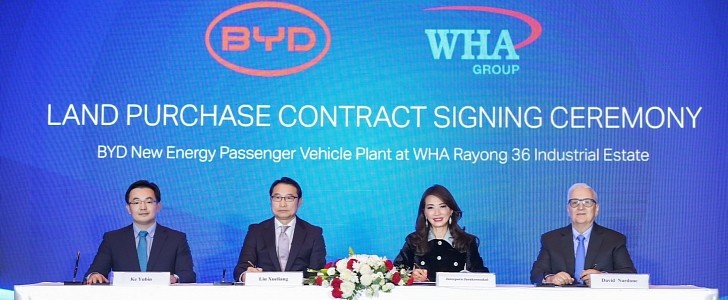If you are willing to buy a BYD in a country with left-hand traffic, there are good chances it will come from a new factory. Australia already buys these cars from China, but BYD wants a factory to concentrate its right-hand drive (RHD) cars. It will be built in Thailand and will start to operate in 2024.
BYD bought a 237-acre plot from WHA Industrial Development PLC in the WHA Rayong 36 Industrial Estate. It is located in Rayong, around 150 kilometers (93 miles) from Bangkok. It is also close to “Rayong's Highways 36 and 3375,” “only 25 km from Map Ta Phut Deep Sea Port, 31 km from Laem Chabang Deep Sea Port, and 23 km to U-Tapao Airport.” In other words, it is ideally located to be an export platform, which is the idea for the new facility.
BYD expects the new factory to produce 150,000 EVs per year. There is no information on how much money the Chinese automaker will invest in the new plant, how many employees it should have, or if this plant will also produce the Blade Batteries these vehicles will need – which is quite likely. BYD is known for promoting verticalization in the right way.
According to the WHA Group, the land purchase confirms that Thailand will become an EV production hub in Asia. By 2030, electric cars should represent 30% of all vehicles produced in the country, which means 700,000 units by that year. Thailand's Board of Investment (BOI) has so far approved “26 EV projects from 17 companies” that represent a production capacity of 830,000 EVs. Perhaps the forecasts for the production of electric cars in the country are being conservative.
As for BYD, it should produce in the country all vehicles based on the e-platform 3.0. So far, we know the Dolphin, Seal, and Frigate 07. Soon we will also know the Seagull, the most affordable vehicle built over this platform. Ít should start at RMB60,000 ($8,662 at the current exchange rate) and cost up to RMB100,000 ($14,437). It would be a great fit for the new Thai facility not only for exports but also for the local market.
BYD expects the new factory to produce 150,000 EVs per year. There is no information on how much money the Chinese automaker will invest in the new plant, how many employees it should have, or if this plant will also produce the Blade Batteries these vehicles will need – which is quite likely. BYD is known for promoting verticalization in the right way.
According to the WHA Group, the land purchase confirms that Thailand will become an EV production hub in Asia. By 2030, electric cars should represent 30% of all vehicles produced in the country, which means 700,000 units by that year. Thailand's Board of Investment (BOI) has so far approved “26 EV projects from 17 companies” that represent a production capacity of 830,000 EVs. Perhaps the forecasts for the production of electric cars in the country are being conservative.
As for BYD, it should produce in the country all vehicles based on the e-platform 3.0. So far, we know the Dolphin, Seal, and Frigate 07. Soon we will also know the Seagull, the most affordable vehicle built over this platform. Ít should start at RMB60,000 ($8,662 at the current exchange rate) and cost up to RMB100,000 ($14,437). It would be a great fit for the new Thai facility not only for exports but also for the local market.

















